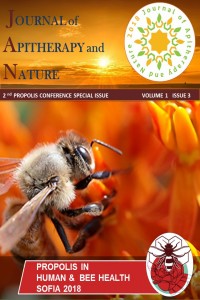Öz
Propolis is a complex resinous mixture produced by
honeybees and used in the construction, repair and defence of hives. Humans
have used propolis in traditional and alternative medicines since ancient
times. Subject of intense research, propolis showed to possess many biological
and pharmacological properties, namely antimicrobial and antioxidant1.
Although clinical studies are still lacking, the broad bioactivities spectrum
of propolis, the continuous discovery of new compounds, its long history of use
and safety profile suggest promising applications in medicine and pharmacology.
The increasing public interest towards natural pharmacological compounds, along
with propolis wide antimicrobial activity and synergy with antibiotics, give
additional stimulus to propolis research.
Portuguese
propolis has deserved little attention by the scientific community2,3
making fundamental to study its chemical fingerprints and biological
properties. In this work, we present some of the results obtained for
Portuguese propolis showing that it is likely to be an important source of
valuable bioactivities: it confers antioxidant protection, has antigenotoxic
effects, displays broad antimicrobial activity, is cytotoxic against some human
carcinoma cells, has anti-inflammatory potential and exhibits phytotoxicity
against in vitro flax plants. Such results not only confirmed some widely known
propolis activities but also suggested new ones for Portuguese propolis,
envisaging potential for several clinical, industrial and environmental
applications as well as for its valorisation.
Operational Competitiveness and Internationalization Programme, under Project
POCI-01-0145-FEDER-006958 and FCT - Portuguese Foundation for Science and
Technology, under the project UID/AGR/04033/2013.
Anahtar Kelimeler
Kaynakça
- 1. Silva-Carvalho R, Baltazar F, Almeida-Aguiar C (2015) Evidence-Based Complementary and Alternative Medicine 2015
- 2 Falcão SI, Vale N, Gomes P, Domingues MR, Freire C, Cardoso SM, Vilas‐Boas M (2012) Phytochemical Analysis 24(4), 309-31
Öz
Kaynakça
- 1. Silva-Carvalho R, Baltazar F, Almeida-Aguiar C (2015) Evidence-Based Complementary and Alternative Medicine 2015
- 2 Falcão SI, Vale N, Gomes P, Domingues MR, Freire C, Cardoso SM, Vilas‐Boas M (2012) Phytochemical Analysis 24(4), 309-31
Ayrıntılar
| Birincil Dil | İngilizce |
|---|---|
| Bölüm | 2nd Propolis Conference Special Issue |
| Yazarlar | |
| Yayımlanma Tarihi | 8 Aralık 2018 |
| Yayımlandığı Sayı | Yıl 2018 Cilt: 1 Sayı: 3 - 2nd Propolis Conference Special Issue |
Kaynak Göster
ASOS Index

